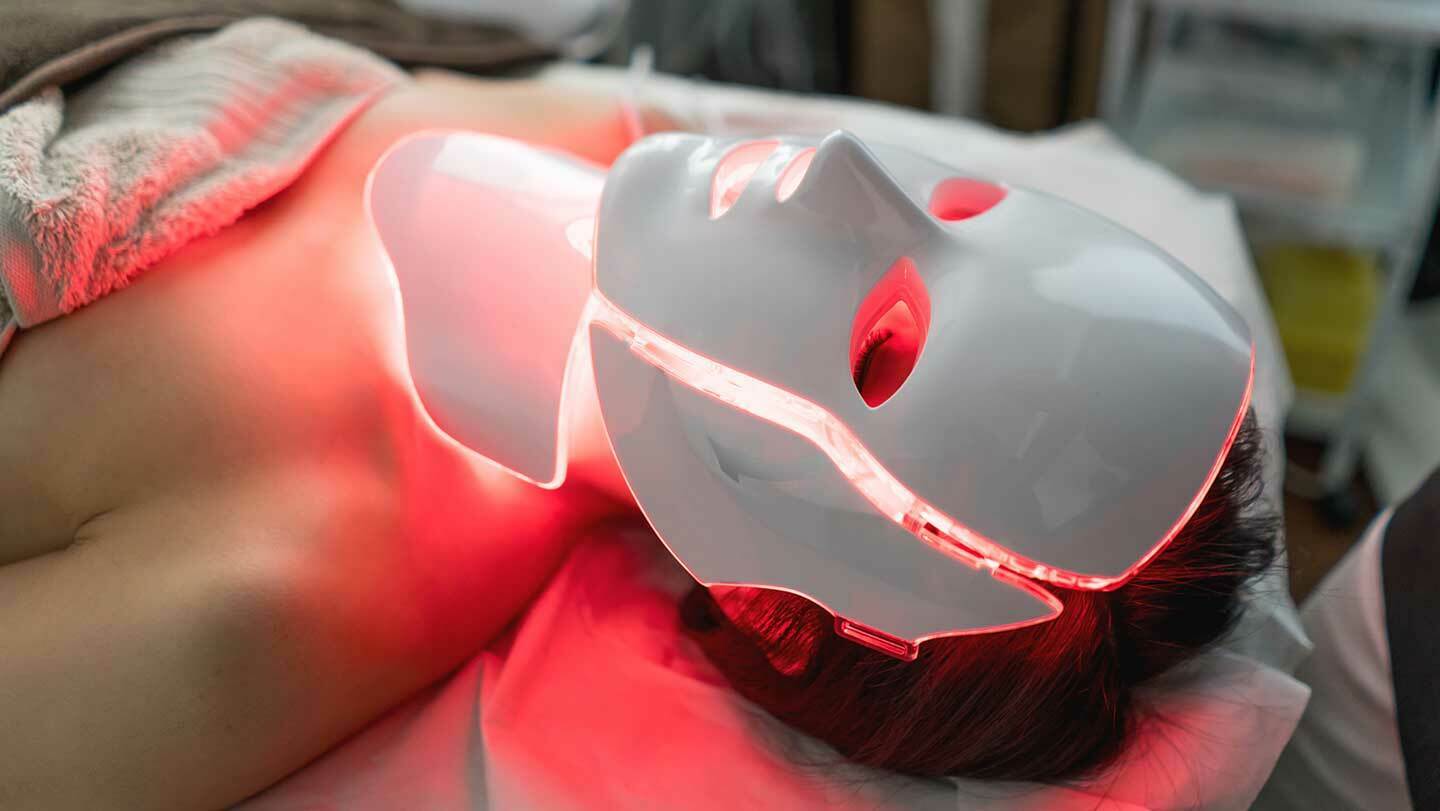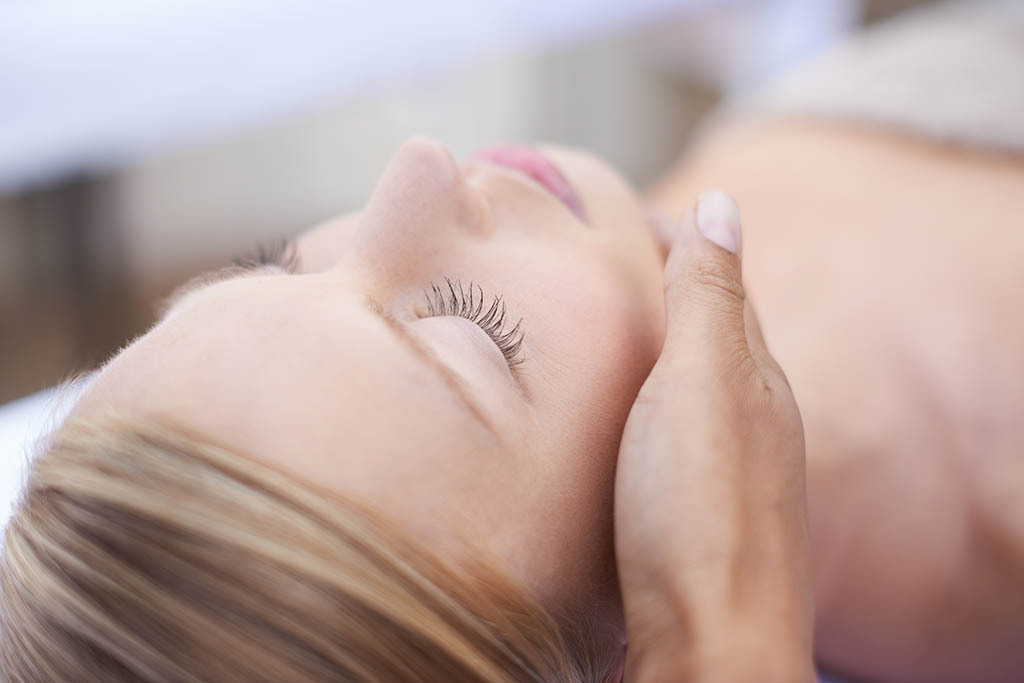If you have sensitive skin, you may be wary of having a facial in case it irritates or causes an extreme reaction. To be fair, some facials can be quite abrasive, using powerful exfoliating products and machines to remove dead skin cells and stimulate collagen production. These are generally not suitable for sensitive skin and should be avoided.
However, there are many facials that are designed specifically for sensitive skin that can be just as effective and should benefit your skin. Tell your therapist that you have sensitive skin, and she should go out of her way to make sure you have the best facial for your skin type. If you have sensitive skin, it should not stop you from enjoying a fabulous facial with the right skincare products.

Can a facial help with sensitive skin?
Sensitive skin is more common than you realise. It’s caused by a variety of factors, from environmental damage - such as sun exposure, pollution, chemotherapy and even extreme facials - to genetics, hormones and ageing. You may notice your skin becomes more sensitive around your period, menopause, or if you are pre- or post-natal; when you have eaten certain foods, used certain products, or if you have been suffering with stress or illness. Too much sun and salty water can also contribute.
What happens when you have sensitive skin is that it can become easily irritated and inflamed. You may find you have allergic reactions to some products, causing rashes, blemishes, flareups and redness or rosacea. You may be prone to acne, rashes or hyperpigmentation.
Sensitivity occurs when your protective skin barrier becomes compromised, allowing moisture to evaporate, making your skin more vulnerable to bacteria, allergens and other irritants.
Sensitive skin facials can help. They can improve your complexion by using products that reduce redness, even your skin pigmentation and calm any inflammation or irritation. They can also help boost your skin’s immunity and restore balance to your protective layers.
Which facials should I go for if I have sensitive skin?
First, you need to know your own specific skin concerns, past reactions and sensitive skin type. Your sensitive skin will be totally different to mine, which is why people with sensitive skin are often better off going for a bespoke or specifically tailored facial at a spa. That way you can voice your concerns with your facialist, and she can match the products to your skin.
Are you dry sensitive (prone to irritations) or oily sensitive (prone to breakouts) or a combination of both? If the former, go for a hydrating facial, for the latter, you need to avoid abrasive facials with extractions, and instead go for an LED or oxygen facial. Always check with the therapist that whatever facial you choose is suitable for your own unique skin sensitivities.
You may see facials for sensitive skin on the treatment menu. A Jennifer Young facial, for example, is specifically designed for those who have sensitive skin and is safe for those who are having treatments for cancer. Made for Life also have a Soothe and Nurture organic facial with a scalp massage.

What is a facial for sensitive skin like?
In your consultation, your therapist will check for ingredients that you are allergic to and ask about your areas of concern. She might tell you about products that can reduce redness and inflammation. Your facial should use natural or organic products, which are soothing, non-reactive, fragrance-free and won’t contain other chemical irritants.
Light peels including fruit enzymes may be used to exfoliate. These are generally light cream or gel-based and are non-abrasive. After gentle cleansing, your therapist may apply a soothing face mask followed by a serum and calming moisturiser, ideally with an SPF factor if you are going outdoors after. Your facial may also have a gentle massage to stimulate your circulation and lymphatic system and boost your skin’s immune system.
A facial for sensitive skin should be a relaxing, pleasant experience and your skin should benefit from the treatment.
What ingredients are good for sensitive skin?
Camomile and green tea can reduce irritation. Green tea is an antioxidant, while camomile contains anti-inflammatory and antibacterial flavonoids. ESPA suggest that cleansers are your best friend if you have sensitive skin, especially light lotions and balms. For example, their Hydrating Cleansing Milk is formulated with mallow and camomile.

Marine based facials can reduce the symptoms of rosacea. Seaweed contains lots of minerals and vitamins, and is an emollient, so good for soothing skin conditions such as eczema and psoriasis. However, marine actives can produce redness in some skins, although this normally subsides after an hour or two.
Products containing vitamin C are good for promoting collagen and elastin production, and for protecting your skin from free radicals.
Hyaluronic acid (HA) serum is good for restoring the skin’s moisture barrier, again giving you that extra layer of protection and reducing irritation caused by dryness.
Aloe Vera is soothing and often used to soothe sunburnt skin. Honey has anti-bacterial qualities and oatmeal is said to restore skin PH balance.
Oxygen facials are a good option if you want a deep cleansing and hydrating facial treatment. A device is used to project a steam of salt water and oxygen onto the skin. It is far less abrasive than most exfoliating techniques.
Dos and Don’ts
Do some research. Find out what products your spa uses and investigate the ingredients before you go.
Talk to your therapist: tell them about your past experiences, your current regime and things you would like to address in the facial.
Avoid extractions, harsh peels or scrubs and dermabrasion devices.
Avoid clay masks as these can draw moisture from the skin, leaving it feeling tight and dry.
Do have facials that are soothing and hydrating.
Don’t be afraid of lactic acid: it’s hydrating and not as harsh as other enzyme exfoliators such as alpha-hydroxy acids (AHAs) or beta-hydroxy acids (BHAs). Always check with your therapist if you are concerned about any of the products and ingredients.
Do try LED lights for acne and anti-ageing rather than extractions and peels. Blue lights kill acne-causing bacteria, while red reduces inflammation.
Do speak up if anything feels wrong – if something feels tingly, burning or stingy, say.
Do use a SPF sunscreen moisturiser to protect your skin against sun and pollutants.

Serene Spy
16th April 2020
Spy Likes:
Attentive friendly staff, personalised treatments, imaginative spa food menu and spas that look after their therapists’ wellbeing too.
Spy Dislikes:
Changing rooms and showers that aren't spotless, tatty towels and robes and having to get dressed for lunch.
